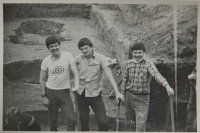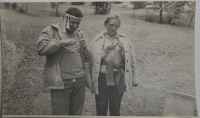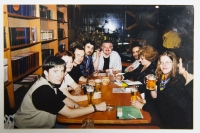A person of many identities
Download image
Andrii Pavlyshyn was born on July 30, 1964 in Lviv in a working family, his mother is originally from Sudova Vyshnia in Lviv region, and his father is from the Lemko Region. Graduated with a gold medal from secondary school №27 (Lviv), was a member of the National Academy of Sciences, as a high school student took part in the archeological expedition in the flooding area of the Dnister HPP. In 1986, he graduated with honors from the Faculty of History of the Ivan Franko Lviv National University, specializing in “New and modern history”, after which he taught for 3 years in Lviv schools №№18, 42. Since 1988, he has been active in public and political life: a member of the board of “Prosvita” and “Memorial” societies, a deputy of the Lviv City Council of two convocations, one of the creators and the first elected chairman of the Social Democratic Party of Ukraine. In 1995-2006 cooperated with “Amnesty International”: coordinator of the group “Ukraine-2” (Lviv), member of the board and chairman of the Ukrainian association of “Amnesty International”. Since 1990, a program editor and editor-in-chief of the publishing department at “Prosvita”, in 1995-1999 - publishing house “Osnovy”, director of the “Osnovy-Zakhid” branch. In 1999-2002 – an editor of the independent cultural magazine “Ї” (Yi) (Lviv), active participant in the projects of the NGO “Ї”. From 2002 to 2006, he worked in “Lvivska Hazeta” (Lviv Newspaper) on various positions, including chief editor. 2003-2009 – a host of the weekly analytical program “Political Chessboard” on Lviv television. Since 2010 he has been a member of the executive board of the PEN Ukraine and a lecturer at UCU. Since 2014 he has been a coordinator of the annual program of events of the “Ukrainian-Jewish Meetings” foundation at the Book Forum in Lviv. Since 2022 he has been a columnist of the TV channel “Espreso”. Has numerous awards and honors.






